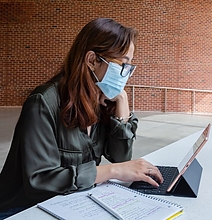 From creating a virtual avatar that performs human-like gestures, to detecting internet censorship, to exploring content moderation in online communities, undergraduate women and non-binary individuals focused on computer science are collaborating this week with leading experts on these topics—and more—at a three-day workshop at the University of Maryland.
From creating a virtual avatar that performs human-like gestures, to detecting internet censorship, to exploring content moderation in online communities, undergraduate women and non-binary individuals focused on computer science are collaborating this week with leading experts on these topics—and more—at a three-day workshop at the University of Maryland.
“Tech + Research: Welcoming Women to Computing Research," which kicks off this Friday and runs through November 14, brings together more than 60 undergraduates from across the country interested in meaningful computing research.
The workshop, now in its fourth year, will run parallel to this weekend’s Technica event, the world’s largest all-women and non-binary hackathon. More than 3,000 hackers are registered to attend Technica this year.
Utsa Santhosh, a UMD senior in computer science and co-executive director of the Technica hackathon, says the Tech + Research workshop provides students with an opportunity to learn about conducting research in a fun and stress-free way.
“So often people are terrified of the word, ‘research,’ and don’t know what it means, or really how to get involved,” she says. “The workshop provides people that safe space to connect with knowledgeable grad students, work on cool projects, and learn about the magic of doing research—all in a positive environment.”
The workshop is managed by the Maryland Center for Women in Computing and the Department of Computer Science, with significant involvement from UMD graduate students who will act as mentors and help run the event.
Eight faculty members in the University of Maryland Institute for Advanced Computer Studies (UMIACS) are also involved, offering their expertise and knowledge in a team-based setting that provides a positive intellectual, social and emotional environment for participants.
Hal Daumé III, a professor of computer science with joint appointments in UMIACS and the Language Science Center, is co-leading leading a project called “What Did I Say Wrong? Surveying Experiences of Content Moderation in Online Communities.”
The project is all about understanding people’s experiences around content moderation in online communities, Daumé says, with the aim of developing better technology that can ensure that people’s voices are heard, while also limiting online abuse.
“I'm excited to explore this question in the context of the Tech + Research workshop, because people from underrepresented genders are statistically more likely to be the targets of such abuse, and therefore need to be part of the solution,” Daumé says.
He adds that the workshop’s goal of bringing more people from underrepresented genders into both computing and research is a prerequisite to ensure that future discoveries in technology work for everyone.
Michelle Mazurek, an associate professor of computer science and director of the Maryland Cybersecurity Center, is co-leading this project with Daumé.
Other UMIACS faculty presenting at the workshop are:
- Ming Lin, a Distinguished University Professor of computer science, will oversee the project “Human-Body Reconstruction- Virtual Try-On Systems.”
- Aniket Bera, an assistant research professor in computer science with appointments/affiliations in UMIACS, the Maryland Robotics Center, and the Brain and Behavior Institute, will run a project called “Digital humans that move, interact, express, and feel, just like us!”
- Daniel Abadi, the Darnell-Kanal Professor of Computer Science, will host the project “Modern Query Federation.”
- Soheil Feizi, an assistant professor of computer science, will lead a project called “Learning by Observation- Building AI Systems that Learn Through ‘Common Sense.’”
- Jordan-Boyd Graber, an associate professor of computer science, will run a project called “Building a Question-Answering System.”
- Dave Levin, an assistant professor of computer science, will oversee the project “Detecting Internet Censorship.” He will also lead an opening “bootcamp” session at the workshop, which will introduce attendees to the basics of computer science research.
—Story by Melissa Brachfeld